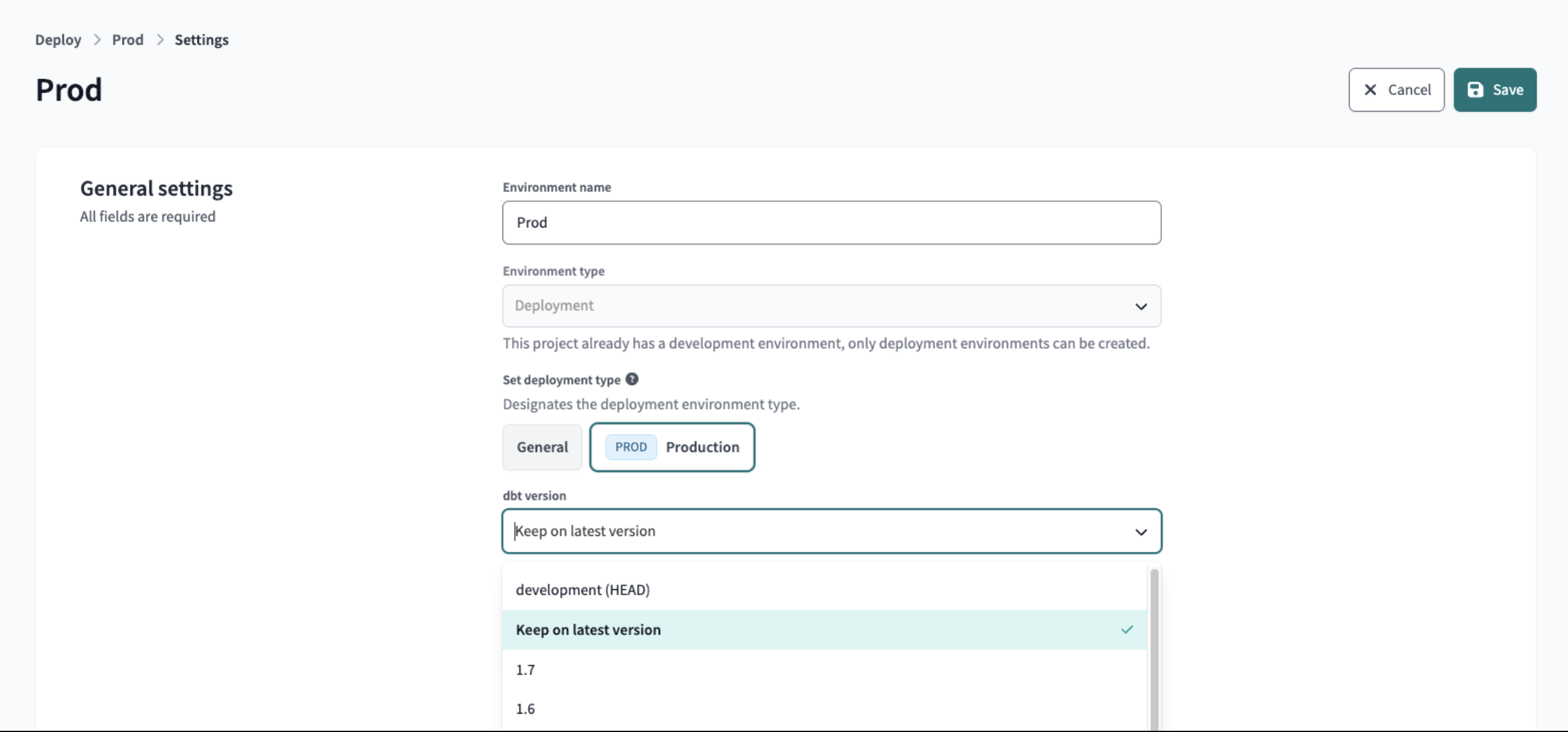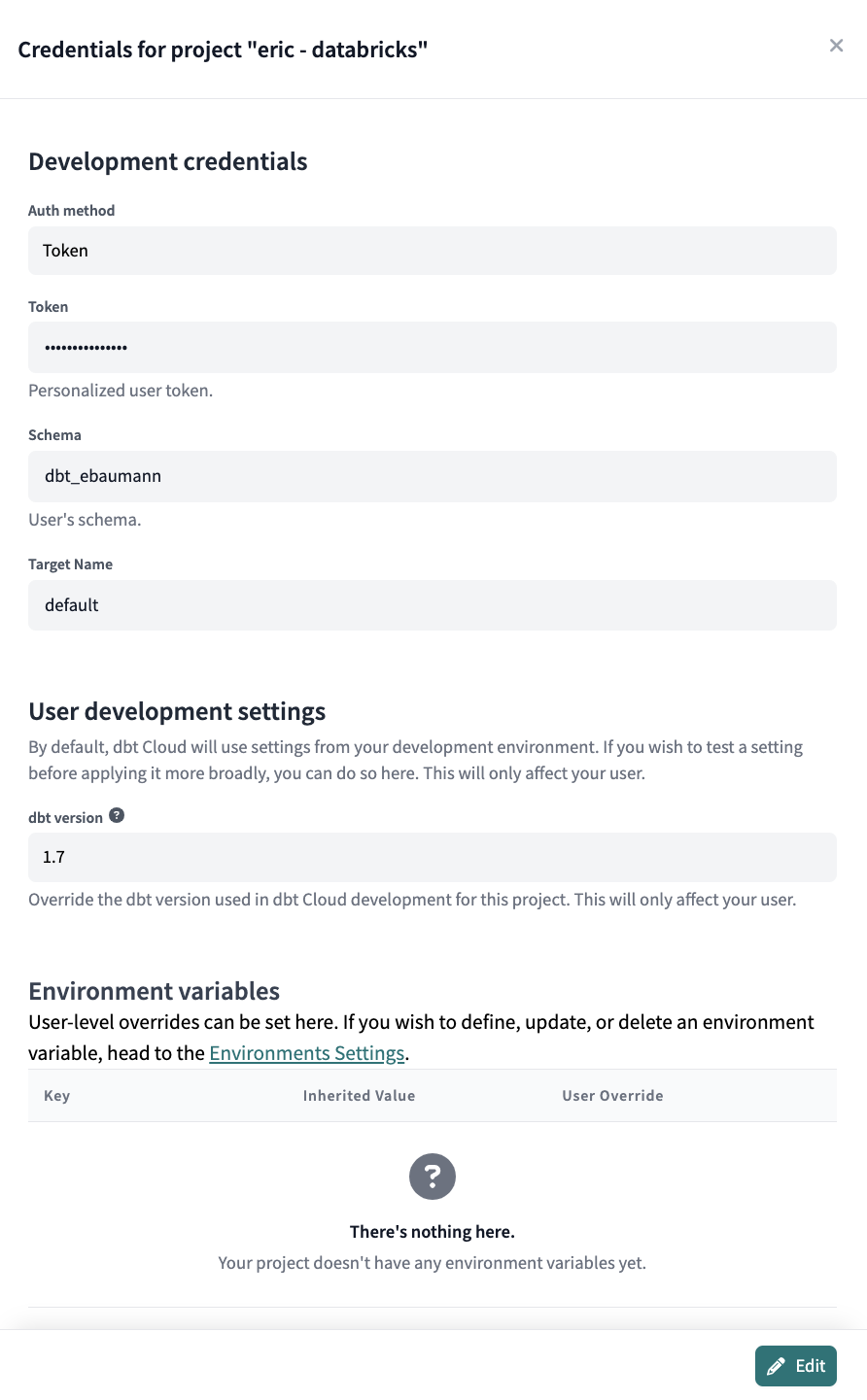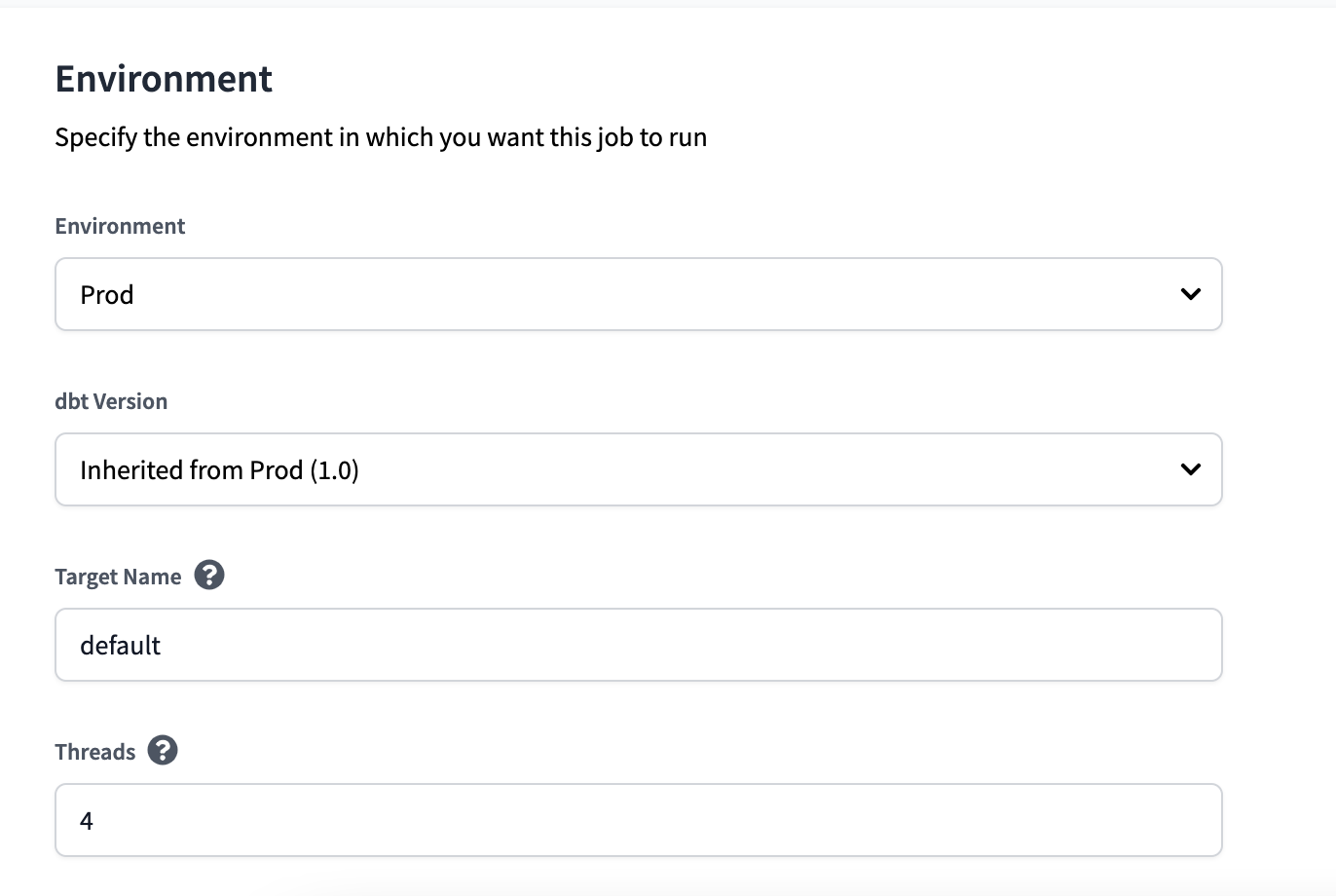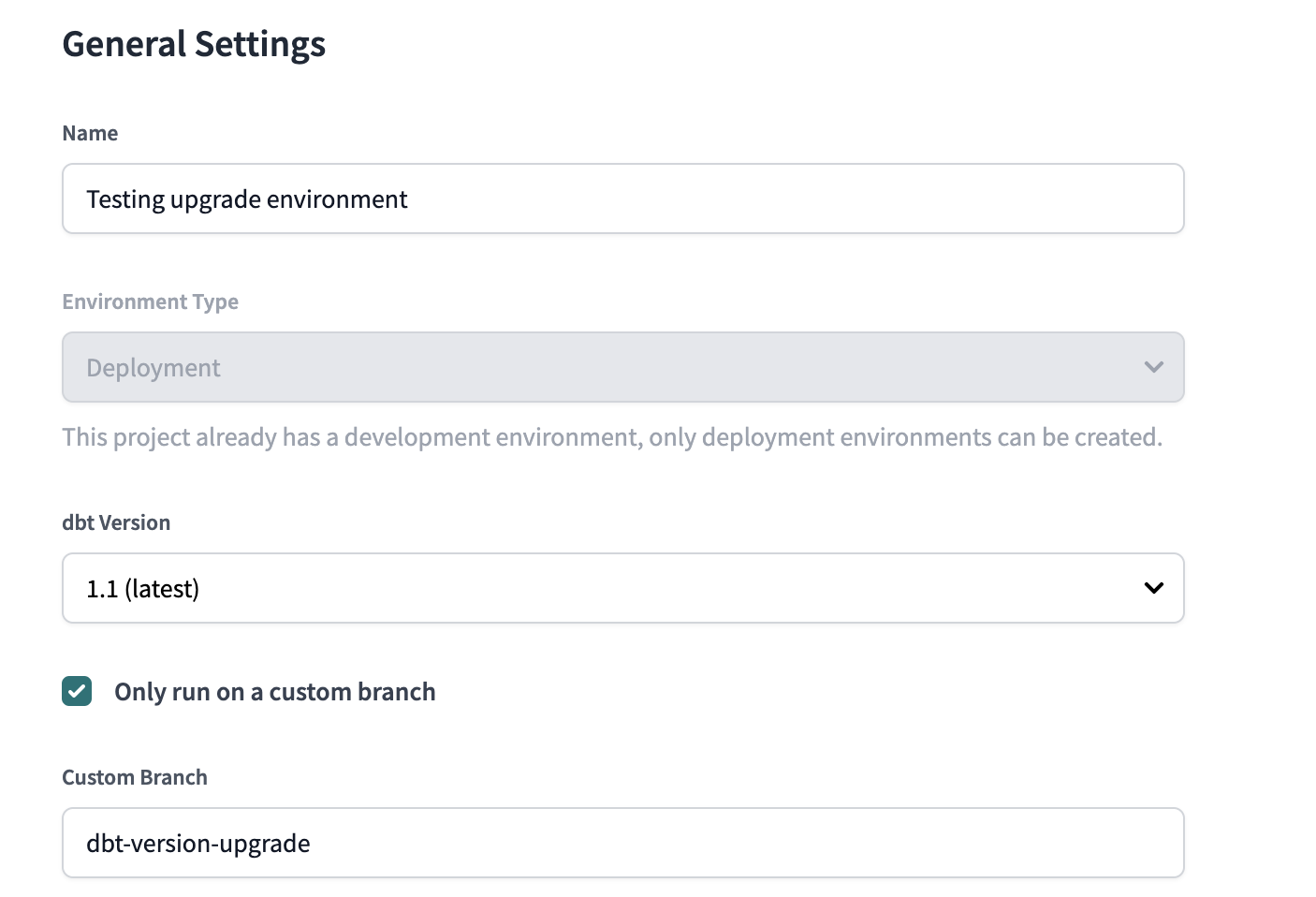Upgrade dbt version in Cloud
In dbt Cloud, both jobs and environments are configured to use a specific version of dbt Core. The version can be upgraded at any time.
Environments
Navigate to the settings page of an environment, then click Edit. Click the dbt version dropdown bar and make your selection. You can select a previous release of dbt Core or Keep on latest version. Be sure to save your changes before navigating away.
Keep on latest version public preview
By choosing to Keep on latest version, you always get the latest fixes and early access to new functionality for your dbt project. dbt Labs will handle upgrades for you, as part of testing and redeploying the dbt Cloud SaaS application.
You can upgrade to Keep on latest version no matter which version of dbt you currently have selected. As a best practice, dbt Labs recommends that you test the upgrade in development first; use the Override dbt version setting to test your project on the latest dbt version before upgrading your deployment environments and the default development environment for all your colleagues.
Microsoft Fabric support will be coming in late March. All other connections are supported.
Override dbt version
Configure your project to use a different dbt Core version than what's configured in your development environment. This override only affects your user account, no one else's. Use this to safely test new dbt features before upgrading the dbt version for your projects.
From the gear menu, select Profile settings.
Choose Credentials from the sidebar and select a project. This opens a side panel.
In the side panel, click Edit and scroll to the User development settings section. Choose a version from the dbt version dropdown and click Save.
An example of overriding the configured version with 1.7 for the selected project:
(Optional) Verify that dbt Cloud will use your override setting to build the project. Invoke
dbt buildin the IDE's command bar. Expand the System Logs section and find the output's first line. It should begin withRunning with dbt=and list the version dbt Cloud is using.Example output of a successful
dbt buildrun:
Jobs
Each job in dbt Cloud can be configured to inherit parameters from the environment it belongs to.
The example job seen in the screenshot above belongs to the environment "Prod". It inherits the dbt version of its environment as shown by the Inherited from ENVIRONMENT_NAME (DBT_VERSION) selection. You may also manually override the dbt version of a specific job to be any of the current Core releases supported by Cloud by selecting another option from the dropdown.
Supported versions
dbt Labs has always encouraged users to upgrade dbt Core versions whenever a new minor version is released. We released our first major version of dbt - dbt 1.0 - in December 2021. Alongside this release, we updated our policy on which versions of dbt Core we will support in dbt Cloud.
Starting with v1.0, all subsequent minor versions are available in dbt Cloud. Versions are actively supported, with patches and bug fixes, for 1 year after their initial release. At the end of the 1-year window, we encourage all users to upgrade to a newer version for better ongoing maintenance and support.
We provide different support levels for different versions, which may include new features, bug fixes, or security patches:
- Active — We will patch regressions, new bugs, and include fixes for older bugs / quality-of-life improvements. We implement these changes when we have high confidence that they're narrowly scoped and won't cause unintended side effects.
- Critical — Newer minor versions transition the previous minor version into "Critical Support" with limited "security" releases for critical security and installation fixes.
- End of Life — Minor versions that have reached EOL no longer receive new patch releases.
- Deprecated — dbt Core versions older than v1.0 are no longer maintained by dbt Labs, nor supported in dbt Cloud.
We'll continue to update the following release table so that users know when we plan to stop supporting different versions of Core in dbt Cloud.
Latest releases
| dbt Core | Initial release | Support level and end date |
|---|---|---|
| v1.8 | April 2024 | Beta |
| v1.7 | Nov 2, 2023 | Active — Nov 1, 2024 |
| v1.6 | Jul 31, 2023 | Critical — Jul 30, 2024 |
| v1.5 | Apr 27, 2023 | Critical — Apr 27, 2024 |
| v1.4 | Jan 25, 2023 | End of Life* ⚠️ |
| v1.3 | Oct 12, 2022 | End of Life* ⚠️ |
| v1.2 | Jul 26, 2022 | End of Life* ⚠️ |
| v1.1 | Apr 28, 2022 | End of Life* ⚠️ |
| v1.0 | Dec 3, 2021 | End of Life* ⚠️ |
| v0.X ⛔️ | (Various dates) | Deprecated ⛔️ |
*All versions of dbt Core since v1.0 are available in dbt Cloud until further notice. Versions that are EOL do not receive any fixes. For the best support, we recommend upgrading to a version released within the past 12 months.
Starting with v1.0, dbt Cloud will ensure that you're always using the latest compatible patch release of dbt-core and plugins, including all the latest fixes. You may also choose to try prereleases of those patch releases before they are generally available.
For more on version support and future releases, see Understanding dbt Core versions.
Need help upgrading?
If you want more advice on how to upgrade your dbt projects, check out our migration guides and our upgrading Q&A page.
Upgrading legacy versions under 1.0
You can use the following sections to successfully upgrade your version of dbt Core in dbt Cloud. We recommend everyone upgrade to the most recent version of dbt Core, as new versions contain enhancements, bug fixes, and updated security features. We document which versions of dbt Core are currently supported.
There aren't many breaking changes between minor versions, and it may be the case that you don't need to change any code to upgrade to a newer version of dbt in dbt Cloud. There are only breaking changes between minor versions of dbt before dbt 1.0. Minor releases starting with dbt 1.0, do not have breaking code changes. If there are no code changes needed, all you have to do is change the settings in your environment or job to run a more recent version of dbt.
Changes between minor versions of dbt that will affect your project
Below we try to help you answer the question of whether a known breaking change between minor versions of dbt will affect your project. If you answer "yes" to any of the questions below, we recommend that you read the migration guides that we've put together for every dbt minor version release.
If you use any packages from dbt Hub, make sure you also upgrade to a version of the package that supports the dbt version you intend to upgrade to. You can see which dbt versions a package supports by checking on the require-dbt-version: in the package's dbt_project.yml file on GitHub.
As an example, dbt-utils version 0.7.6 supports dbt v0.20, v0.21, and v1.0, as described in its dbt_project.yml.
After you've changed the package version in your packages.yml file, be sure to run dbt deps in the IDE to install the updated version.
Upgrading to v1.0.latest from v0.21
Certain configurations in dbt_project.yml have been renamed
Existing projects will see non-breaking deprecation warnings. You can change three lines in most projects to remove the warnings:
model-paths: ["models"] # formerly named "source-paths"
seed-paths: ["data"] # formerly named "data-paths"
clean-targets:
- "target"
- "dbt_packages" # formerly named "dbt_modules"
- Do you select tests using the old names for test types? (
test_type:schema,test_type:data,--schema,--data) - Do you have custom macro code that calls the (undocumented) global macros
column_list,column_list_for_create_table,incremental_upsert? - Do you have custom scripts that parse dbt JSON artifacts?
- (BigQuery only) Do you use dbt's legacy capabilities around ingestion-time-partitioned tables?
If you believe your project might be affected, read more details in the migration guide here.
Upgrading to v0.21.latest from v0.20
- Do you select specific sources to check freshness (
dbt snapshot-freshness --select <source_name>)? - Do you have custom scripts that parse dbt JSON artifacts?
- (Snowflake only) Do you have custom macros or materializations that depend on using transactions, such as statement blocks with
auto_begin=True?
If you believe your project might be affected, read more details in the migration guide here.
Upgrading to v0.20.latest from v0.19
- Does your project define any custom schema tests?
- Does your project use
adapter.dispatchor thespark_utilspackage? - Do you have custom scripts that parse dbt JSON artifacts?
If you believe your project might be affected, read more details in the migration guide here.
Upgrading to v0.19.latest from v0.18
- Do you have custom scripts that parse dbt JSON artifacts?
- Do you have any custom materializations?
If you believe your project might be affected, read more details in the migration guide here.
Upgrading to v0.18.latest from v0.17
- Do you directly call
adapter_macro?
If you believe your project might be affected, read more details in the migration guide here.
Upgrading to v0.17.latest from v0.16
You must add config-version: 2 to your dbt_project.yml file.
name: my_project
version: 1.0.0
config-version: 2
vars:
my_var: 1
another_var: true
models:
...
vars: are now defined not in your models: but are a separate section in dbt_project.yml file.
name: my_project
version: 1.0.0
config-version: 2
vars:
my_var: 1
another_var: true
models:
...
- Do you have dictionary configs in your dbt_project.yml such as
partition_byorpersist_docs? If yes, you need to add a preceding +.
models:
my_project:
reporting:
+partition_by:
field: date_day
data_type: timestamp
If you believe your project might be affected, read more details in the migration guide here.
Upgrading to v0.16.latest from v0.15
- Do you use the custom
generate_schema_namemacro? - Do you use
partition_byconfig for BigQuery models?
If you believe your project might be affected, read more details in the migration guide here.
Upgrading to v0.15.latest from v0.14
- Do you have a custom materialization?
- Do you have a macro that accesses
Relationsdirectly?
If you believe your project might be affected, read more details in the migration guide here.
Upgrading to v0.14.latest from v0.13
- Do you still use
Archives? - Do you use the custom
generate_schema_namemacro? - Do you use the
—non-destructiveflag?
If you believe your project might be affected, read more details in the migration guide here.
Testing your changes before upgrading
Once you know what code changes you'll need to make, you can start implementing them. We recommend you create a separate dbt project, Upgrade Project, to test your changes before making them live in your main dbt project. In your Upgrade Project, connect to the same repository you use for your production project. This time, set the development environment settings to run the latest version of dbt Core. Next, check out a branch dbt-version-upgrade, make the appropriate updates to your project, and verify your dbt project compiles and runs with the new version in the IDE. If upgrading directly to the latest version results in too many issues, try testing your project iteratively on successive minor versions. There are years of development and a few breaking changes between distant versions of dbt Core (for example, 0.14 --> 1.0). The likelihood of experiencing problems upgrading between successive minor versions is much lower, which is why upgrading regularly is recommended.
Once you have your project compiling and running on the latest version of dbt in the development environment for your dbt-version-upgrade branch, try replicating one of your production jobs to run off your branch's code. You can do this by creating a new deployment environment for testing, setting the custom branch to 'ON' and referencing your dbt-version-upgrade branch. You'll also need to set the dbt version in this environment to the latest dbt Core version.
Then add a job to the new testing environment that replicates one of the production jobs your team relies on. If that job runs smoothly, you should be all set to merge your branch into main and change your development and deployment environments in your main dbt project to run off the newest version of dbt Core.




